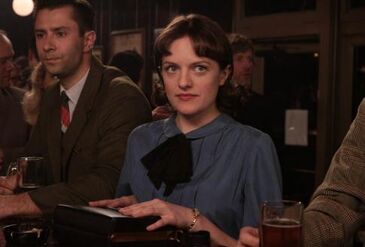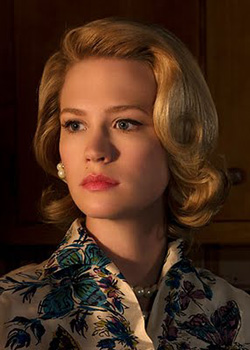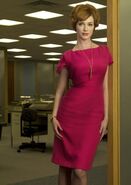Towards the end of the first season, Peggy Olson goes out on a date set up by her mother. The guy, Carl, drives a potato chip delivery truck, and makes it clear that he doesn’t think too highly of Peggy’s chosen profession. “You don’t look like those girls,” he tells her. Peggy storms off, snapping at Carl, “They are better than us. They want things they haven’t seen.”
I don’t agree, at least not when it comes to the main women of Mad Men. Joan and Betty are victims of both their class and their gender, and the only thing they would seem to aspire to is what they know and what they see: the comforts of an middle-to-upper class existence.
One element that has always fascinated me about Mad Men has been the element of class mobility and class-based constraints. The women, in particular, embody the opportunities and limitations of class during the 1960s. Looking at the characters of Peggy, Joan, and Betty, it becomes clear that if the people who live in Manhattan want things they haven’t seen, they are limited in being able to attain those goals by their class and class constraints.
 |
| Peggy Olson |
From the beginning, Peggy is presented to us as a girl in her dress and her manners. She tells Joan that she attended “Miss Devers Secretarial School,” and while Joan reveals that it is one of the best, it isn’t a college education. We also see her small and simple apartment, later learning she is from the Bronx and, during the second season, Catholic. Her sister’s husband has been hurt on the job and unable to work, and their rather large family is living in a small apartment. All of this indicates that Peggy comes from a working-class background.
The episode mentioned above is an important moment for Peggy; in the same episode, Peggy has a successful pitch for the “Electrolizer.” Peggy is able to somewhat comfortably talk about the fact that the machine is a vibrator. Juxtapose Peggy’s ability to articulate the benefits of the Electrolizer versus Betty’s experience with the washing machine in the same episode. One embraces the freedom the machine can/could provide for women, while the other has to make do.
 |
| Betty Draper Francis |
Betty came from both class and means; her family is wealthy, and from the descriptions of her mother, quite proper in terms of gender and class norms. Her mother disapproved of her brief career as a model after Betty had graduated from Bryn Mawr College. All of her married friends seemed to have attended one of the “Seven Sister” schools and traveled extensively in Europe.
For her, her marriage is her goal. She was raised to want to look pretty in order to attract an acceptable husband. She might be unhappy in her marriage to Don, but she has no idea how to escape or to fulfill herself. I saw her holding a rifle, smoking a cigarette, and shooting her neighbors birds not as a symbol of a woman rising up to defend her family, but of a woman who couldn’t bear even a reminder of freedom. Like the birds, she, too, would always come home.
 |
| Joan Holloway Harris |
Joan, too, is the picture of elegance. She has gone to college and has moved up as far as she can professionally, enjoying being single while looking for a husband. She finds (and problematically marries) an aspiring surgeon. While it isn’t clear what kind of background Joan comes from, it is clear that she possesses the proper credentials for a woman who came from class or means.
Joan’s rape has, obviously, generated a lot of debate. I read it, however, as a type of class sacrifice; in order to “keep” her professional and respectable husband, she has to stay silent about her rape. It is never made clear if Joan truly loves Greg, or views him as her last chance at class respectability. Joan also quits her job at Sterling-Cooper once she is married because it is no longer necessary, but also no longer socially acceptable. But it isn’t just that. When she has the opportunity to read scripts and make valuable contributions to the newly-formed television department, Joan doesn’t speak up when an inexperienced man receives her job. Contrasted with Peggy’s courage to ask for Freddy Rumsen’s old office, Joan would seem to be trapped not just by the constraints of her gender, but the constraints of her upper-class upbringing.
One could also read the competition between Joan and Peggy as a competition between two women from different socio-economic class; Peggy doesn’t know the rules, doesn’t “look” the part, and Joan tries to help her “fit in” as an women with middle-class aspiration. But Peggy isn’t interested in marrying up; her ignorance of the rules is her biggest strength as she is not limited by the gender pressures of middle and upper-class expectations.
Peggy, in her quote about wanting things they haven’t seen yet, could be referring to the women that Don Draper consorts with throughout the first two seasons. Midge Daniels is a bohemian, for class seems to hold no allure or power. Rachel Menken has managed to transcend class (and racial/religious) boundaries and become a power-driven professional woman. The same goes for Bobbie Barrett, who manages her husband’s show biz career with savvy and ruthlessness. Each of these women is successful at eschewing the limits placed on them by class expectations.
It is interesting that when Don is faced with a choice between a non-traditional woman (Dr. Faye Miller) and his secretary (Megan), he chooses the latter. Faye and Peggy are, ultimately romantically punished for their non-traditional interpretations of class and gender norms. It remains to be seen how Faye bounces back from Don’s rejection, but Peggy is certainly doing better than either Betty or Joan when it comes to personal and professional success.
Call it the limitations of an upper-class upbringing; sometimes we can only want what it is we see.
Lee Skallerup Bessette has a PhD in Comparative Literature and currently teaches writing in Kentucky. She also blogs at College Ready Writing and the University of Venus. She has two kids, and TV and movies are just about the only thing she has time for outside of her work and family.
